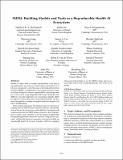MEDS: Building Models and Tools in a Reproducible Health AI Ecosystem
Author(s)
McDermott, Matthew; Xu, Justin; Bergamaschi, Teya; Jeong, Hyewon; Lee, Simon; Oufattole, Nassim; Rockenschaub, Patrick; Steinberg, Ethan; Sun, Jimeng; Water, Robin; Wornow, Michael; Wu, John; Wu, Zhenbang; Stankevičiūtė, Kamilė; ... Show more Show less
Download3711896.3737608.pdf (795.9Kb)
Publisher Policy
Publisher Policy
Article is made available in accordance with the publisher's policy and may be subject to US copyright law. Please refer to the publisher's site for terms of use.
Terms of use
Metadata
Show full item recordAbstract
Health AI suffers from a systemic reproducibility crisis that irreparably hinders research in this space across academia and industry. To combat this and empower researchers in the health AI space, we propose a comprehensive interactive tutorial introducing the ''Medical Event Data Standard'' (MEDS) and its growing open-source ecosystem. Working in MEDS allows you to more easily build AI models over public or private longitudinal EHR datasets and to readily benchmark existing, published models against contributions on local datasets and tasks. MEDS simplifies the construction of AI models on longitudinal Electronic Health Record (EHR) datasets and enables straightforward benchmarking against established models. Reflecting its growing adoption, MEDS is utilized at over 15 institutions across 8 countries, features 7+ open-source tools, supports 10+ published models, and provides publicly available Extract-Transform-Load (ETL) pipelines for major public EHR datasets. A KDD tutorial offering practical experience with MEDS will significantly enhance reproducibility and comparability in health AI research.
In this tutorial, we will teach attendees how to (1) transform datasets into the MEDS format(2) pre-process MEDS data for modeling needs(3) build highly effective, efficient, AI models for diverse predictive tasks on their datasets, and (4) contribute their results to MEDS-DEV, a decentralized benchmark enabling robust evaluation against meaningful baselines. Participants will engage in collaborative, minimal-dependency Jupyter notebook exercises, guided through each step by structured instruction and practical coding sessions. Attendees will leave equipped with practical knowledge to build reproducible, state-of-the-art AI models within the MEDS ecosystem.
Description
KDD ’25, Toronto, ON, Canada
Date issued
2025-08-03Department
Massachusetts Institute of Technology. Department of Electrical Engineering and Computer SciencePublisher
ACM|Proceedings of the 31st ACM SIGKDD Conference on Knowledge Discovery and Data Mining V.2
Citation
Matthew B. A. McDermott, Justin Xu, Teya S. Bergamaschi, Hyewon Jeong, Simon A. Lee, Nassim Oufattole, Patrick Rockenschaub, Kamilė Stankevičiūtė, Ethan Steinberg, Jimeng Sun, Robin P. van de Water, Michael Wornow, John Wu, and Zhenbang Wu. 2025. MEDS: Building Models and Tools in a Reproducible Health AI Ecosystem. In Proceedings of the 31st ACM SIGKDD Conference on Knowledge Discovery and Data Mining V.2 (KDD '25). Association for Computing Machinery, New York, NY, USA, 6243–6244.
Version: Final published version
ISBN
979-8-4007-1454-2